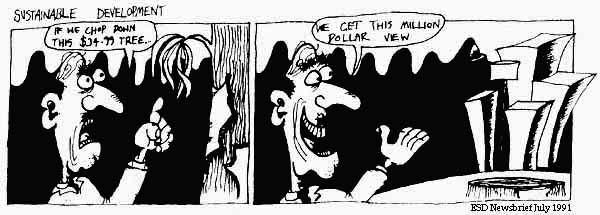If the environment is a set of resources for the economic system then, economists argue, the market is the most efficient way of allocating those resources:
Any economist will tell you that the environment really ought to be classified as a resource; hence it should fall fairly and squarely into the policy arena concerning the allocation of resources. Management of the environment is essentially an economic problem.

Economists argue that environmental degradation has resulted from the failure of the market system to put any value on the environment, even though the environment does serve economic functions and provides economic and other benefits. It is argued that because environmental `assets' are free or underpriced they tend to be overused or abused, resulting in environmental damage. Because they are not owned and do not have price tags then there is no incentive to protect them. This is a view shared by business people. The Business Council of Australia argues that it is not economic growth that is the real problem;
Rather, it is that important environmental assets tend not to be priced in a market like other assets. These assets are common property - they belong to everybody, and to nobody. Without ownership rights there is not the incentive for any person or group to look after them properly... if the environment has a zero price to users it will eventually be used up.
 In order to fix this perceived problem, sustainable development involves putting a price on the environment and charging people to use it, privatising the commons, and creating artificial markets and price mechanisms through economic instruments and tradeable rights to pollute. The idea is that "the power of the market can be harnessed" to environmental goals.
In order to fix this perceived problem, sustainable development involves putting a price on the environment and charging people to use it, privatising the commons, and creating artificial markets and price mechanisms through economic instruments and tradeable rights to pollute. The idea is that "the power of the market can be harnessed" to environmental goals.
However, the real problem is not that the environment is not privately owned or valued on the market but rather that economic considerations take priority in most countries around the world. The tragedy of the commons is not that there are commons but rather the freedom of the commons. The lack of legal sanctions combined with a value system that promotes the raising of individual economic interest to a primary decision-making principle is what destroys the commons.
Seen in this light, economic instruments, privatisation and environmental `valuation' are all mechanisms for perpetuating the central problems that caused environmental degradation in the first place. They ensure priority is still given to economic goals and they enable individuals and firms to make decisions that affect others on the basis of their own economic interests. The primacy of `free' markets in environmental decision-making ensures that power remains in the hands of those who direct and control financial resources; the wealthy, the corporations and the economists they employ.
Vandana Shiva, an Indian activist, points out that sustainability should require that markets and production process be reshaped to fit nature's logic rather than "the logic of profits and capital accumulation, and returns on investment" determining nature's fate. Instead, she says, sustainable development "protects the primacy of capital. It is still assumed that capital is the basis of all activity."